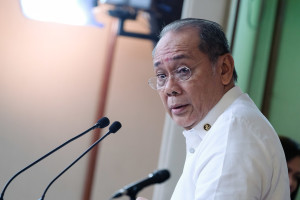Malaysia on Monday opposed the statement on the Rohingya crisis in Myanmar issued by Association of Southeast Asian Nations (Asean) Chair and Foreign Secretary Alan Peter Cayetano, calling it a “misrepresentation of reality.”
In the statement issued by Cayetano on Saturday in New York, the Asean condemned the attacks on Myanmar’s security forces on Aug. 25 in the Northern Rakhine State, as well as “all acts of violence which resulted in loss of civilian lives, destruction of homes and displacement of large numbers of people.”
But in a rare show of disagreement by a member of the 10-nation bloc known for building consensus and unity, Malaysian Foreign Minister Anifah Aman said his country disassociated itself from the Asean statement as it misrepresented “the reality of the situation.”
Anifah said the statement omitted reference to Rohingya Muslims as one of the affected communities and “was not based on consensus.”
“While Malaysia condemns the attacks against Myanmar security forces launched by the Arakan Rohingya Salvation Army (Arsa), the subsequent ‘clearance operations’ efforts by Myanmar authorities was disproportionate in that it has led to deaths of many innocent civilians and caused more than 400,000 Rohingyas to be displaced,” Anifah’s statement read.
Violence began in the Buddhist-majority Myanmar on Aug. 25 when Arsa militants attacked about 30 police posts and an army camp, killing 12 people.
About 400 people, the majority of them insurgents, have been killed in the military counteroffensive that followed, which the United Nations has described as ethnic cleansing. About 430,000 Rohingya have also fled across the border to Bangladesh.
Anifah said Malaysia had urged Myanmar to “end the violence, stop the destruction to lives and properties, allow … access for the delivery of humanitarian aid to the Rohingya and all affected communities, and to resolve the Rohingya refugee problem.”
The Philippines said it respected Malaysia’s decision to dissociate itself from the Asean statement.
“The Philippines as chair tolerates the public manifestation of dissenting voices,” the Department of Foreign Affairs (DFA) said.
As this year’s chair of the regional bloc, the Philippines is allowed a certain level of flexibility in formulating the Asean statement on various issues, it said.
Muslim-majority Malaysia and Indonesia have expressed concern about the atrocities perpetrated against the Rohingya, whom Myanmar describes as illegal immigrants from Bangladesh.
The DFA said Cayetano’s statement reflected the “general sentiments” of the other foreign ministers, who met on the sidelines of the recent 72nd session of the UN General Assembly. —Dona Z. Pazzibugan, Marlon Ramos and Inquirer wires


